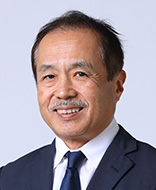
Tohoku University has been selected as a candidate for the "Universities of International Research Excellence" to be supported by the investment profits of a 10 trillion-yen fund. In terms of a university that conducts internationally outstanding (i.e., world-class) research, Tohoku University, which has been committed to the "research first" principle since its founding, should just focus on research as per its philosophy. However, for conducting world-class research, the university is required to make major changes in academic and operational reforms so that students and faculty members can focus on research, create an environment where young researchers can conduct research independently, and design careers so that all members of Tohoku University, including students, faculty, and staff, can be active and brilliant on a global scale. The Graduate School of Biomedical Engineering is also in the midst of these changes.
Although sometimes mistaken, we are not the Institute of Biomedical Engineering, but the Graduate School of Biomedical Engineering. Therefore, the mission of the faculty is not only to achieve significant research results themselves, but also to advance biomedical engineering research by educating students. Currently, we are increasing the amount of time students can concentrate on their research by reorganizing lectures and practical training courses and utilizing online/on-demand classes. These reforms are also increasing the amount of time faculty members have for research. In addition, students do not just assist the research of faculty members, but rather conduct their own research as an independent researcher, thereby fostering a sense of responsibility and conceptual ability that will enable them to be immediately effective in research fields at research institutes and companies after completion of the program.
Internationalization is also required as a priority item of the "University of International Research Excellence," with commitments to increase the ratio of international students to 40% and to invite internationally outstanding foreign faculty members. The Graduate School of Biomedical Engineering will promote internationalization with an emphasis on "export" as well as "import". We will expand the short-term study abroad and internship programs for students at overseas universities and research institutes that we are currently offering. In addition, we are already offering joint lectures with overseas universities through online classes, and will further increase the number of partner universities and expand the double degree and joint degree programs with overseas universities in the future.
Japanese culture is said to be a culture of "wa" (harmony). This may seem to be the opposite of internationalization, but "wa" is extremely important for medical-engineering collaboration. Harmony is created and medicalengineering collaboration matures when researchers from different fields, such as medicine and engineering, breathe the same air. We are providing medical and biological education for science and engineering graduates and engineering education for medical, health, and biological students. We send students to our university hospital to explore clinical needs and create new idea on medical devices through medical device development training. The Graduate School of Biomedical Engineering also emphasizes "harmony" with industry, and conducts many joint and funded research projects, as well as the Educational Program on Medicine and Biomedical Engineering for Engineers (EMBEE).
The Graduate School of Biomedical Engineering aims not only to conduct biomedical engineering research and develop medical devices, but also to change the concept of health and enrich human life. Students, medical professionals, and companies, join us, the Graduate School of Biomedical Engineering, in spreading the "harmony" of biomedical engineering to the world.
Dean, Graduate School of Biomedical Engineering, Tohoku University
Yoshifumi Saijo
Biomedical engineering is an education and research discipline that seeks to bring innovation to the conventional fields of medicine and biology through an engineering perspective predicated on mathematics, physics and chemistry. Biomedical engineering marries engineering theory, knowledge and practical applications with basic knowledge and specialized technology from medicine and biology in order to further understand the mechanisms and functions of life and, in turn, to promote ongoing advancements in medicine, biology and engineering.
The Graduate School of Biomedical Engineering is dedicated to the pursuit of international-standard biomedical research in line with the tenets of Tohoku University: research first, an open-door policy, and an overriding emphasis on practice-oriented research and education. Research programs at the Graduate School equip graduates with the basic theory and applied expertise to become world-leading researchers and advanced engineers. Our mission is to contribute to social welfare and to improve human welfare by taking a new approach to the conventional foundations of this academic discipline and promoting fundamental innovation in the field of medicine.

Our aim is to educate researchers and engineers who have creativity, strong research skills, and expert knowledge in the integrated field of biomedical engineering. These researchers and engineers will pursue their own research and development to promote evolution and innovation in science for the improvement of medicine and social welfare in order to realize a truly affluent society.

Biomedical engineering is a new interdisciplinary field that bridges the gap between engineering and biomedicine and, by integrating them, aims for the evolution of both. This field develops not only by collaboration and expertise in medicine and engineering, but also by creation of new discipline. Therefore, in our graduate school of biomedical engineering, we teach in-depth knowledge and techniques of engineering and broad expertise in biomedicine to foster the discovery of new principles in biology and medical science and new technology for medical diagnosis and treatment.

| Dean, Graduate School of Biomedical Engineering | SAIJO, Yoshifumi |
| Member of Education and Research Council | YOSHINOBU, Tatsuo |
| Member of Education and Research Council | TANAKA, Mami |
| Vice-Dean, Graduate School of Biomedical Engineering | TANAKA, Tetsu |
| Advisor to the Dean (Education and Student Affairs ) | WATANABE, Takashi |
| Advisor to the Dean (Research and Compliance) | ISHIKAWA, Takuji |
| Advisor to the Dean (Financial Affairs) | YABUKAMI, Shin |
| Advisor to the Dean (Future vision & Hospital Cooperation) | NIIZUMA, Kuniyasu |
| Advisor to the Dean (Gender Equality) | TANAKA, Mami |
| Advisor to the Dean (Public Relations) | YOSHINOBU, Tatsuo |
| Director, Biomedical Engineering Cancer Research Center | KODAMA, Tetsuya |
| Director, Medical Device Innovation Center | SAIJO, Yoshifumi |